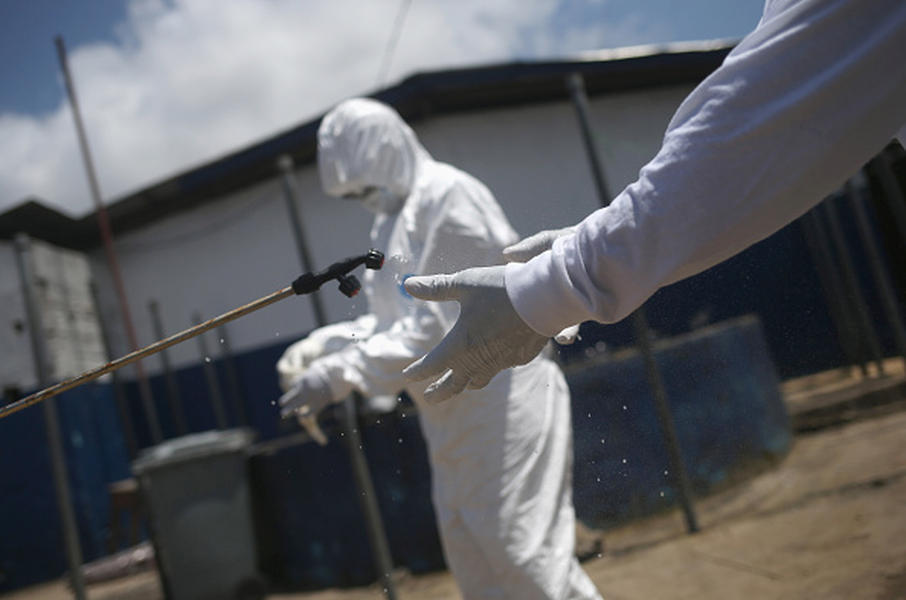With all eyes on Ebola, efforts to control malaria could fail


A free daily email with the biggest news stories of the day – and the best features from TheWeek.com
You are now subscribed
Your newsletter sign-up was successful
The gains being made in the fight against malaria in West Africa could be erased due to the Ebola outbreak, a doctor from the Roll Back Malaria Partnership warns.
Three of the countries devastated by Ebola — Guinea, Sierra Leone, and Liberia — saw a combined 7,000 deaths from malaria in 2012, with many of those victims small children. "These countries have previously been really hit by malaria," Dr. Fatoumata Nafo-Traoré told the BBC. "We all agree that no child should die from malaria, because we have the tools to prevent and treat it. But now, understandably, all the health workers' attention is on Ebola."
Nafo-Traoré is worried that hospital wards that once cared for children with malaria are empty not because there aren't any cases, but because all of the medical workers are treating Ebola. Early symptoms of Ebola and malaria are the same, so people who are receiving aid are being treated with anti-malarial drugs, but "at the moment when people have fevers, they are often afraid to go to health-care facilities because they want to avoid being held in the Ebola treatment centers."
The Week
Escape your echo chamber. Get the facts behind the news, plus analysis from multiple perspectives.

Sign up for The Week's Free Newsletters
From our morning news briefing to a weekly Good News Newsletter, get the best of The Week delivered directly to your inbox.
From our morning news briefing to a weekly Good News Newsletter, get the best of The Week delivered directly to your inbox.
Locals are suspicious of of health workers, Nafo-Traoré said, and "there's still a feeling it's them who are bringing the virus to people." Nafo-Traoré says she does feel some relief after seeing checkpoints on her way to Guinea from Sierra Leone where people were washing their hands and having their temperatures taken. "It's important to have a coordinated approach," she said. "A key aim is to decrease cases of malaria-related fever, so the Ebola centers don't get overwhelmed."
A free daily email with the biggest news stories of the day – and the best features from TheWeek.com
Catherine Garcia has worked as a senior writer at The Week since 2014. Her writing and reporting have appeared in Entertainment Weekly, The New York Times, Wirecutter, NBC News and "The Book of Jezebel," among others. She's a graduate of the University of Redlands and the Columbia University Graduate School of Journalism.
-
 Tourangelle-style pork with prunes recipe
Tourangelle-style pork with prunes recipeThe Week Recommends This traditional, rustic dish is a French classic
-
 The Epstein files: glimpses of a deeply disturbing world
The Epstein files: glimpses of a deeply disturbing worldIn the Spotlight Trove of released documents paint a picture of depravity and privilege in which men hold the cards, and women are powerless or peripheral
-
 Jeff Bezos: cutting the legs off The Washington Post
Jeff Bezos: cutting the legs off The Washington PostIn the Spotlight A stalwart of American journalism is a shadow of itself after swingeing cuts by its billionaire owner
-
 Nobody seems surprised Wagner's Prigozhin died under suspicious circumstances
Nobody seems surprised Wagner's Prigozhin died under suspicious circumstancesSpeed Read
-
 Western mountain climbers allegedly left Pakistani porter to die on K2
Western mountain climbers allegedly left Pakistani porter to die on K2Speed Read
-
 'Circular saw blades' divide controversial Rio Grande buoys installed by Texas governor
'Circular saw blades' divide controversial Rio Grande buoys installed by Texas governorSpeed Read
-
 Los Angeles city workers stage 1-day walkout over labor conditions
Los Angeles city workers stage 1-day walkout over labor conditionsSpeed Read
-
 Mega Millions jackpot climbs to an estimated $1.55 billion
Mega Millions jackpot climbs to an estimated $1.55 billionSpeed Read
-
 Bangladesh dealing with worst dengue fever outbreak on record
Bangladesh dealing with worst dengue fever outbreak on recordSpeed Read
-
 Glacial outburst flooding in Juneau destroys homes
Glacial outburst flooding in Juneau destroys homesSpeed Read
-
 Scotland seeking 'monster hunters' to search for fabled Loch Ness creature
Scotland seeking 'monster hunters' to search for fabled Loch Ness creatureSpeed Read
